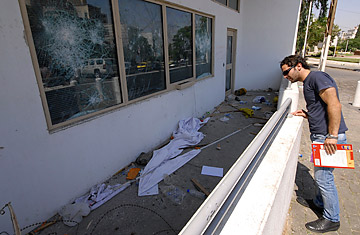
A man checks the damaged American embassy in Damascus after progovernment protesters attacked the embassy compound on Monday, July 11, 2011
(2 of 2)
He requested permission from the conference chair for his two young colleagues, seated beside him, to also address the meeting. "I beg you, I beg you, I beg you, there is an internal problem. There is blood in the streets. I would like one Friday to pass without hearing about a martyr. I beg you, I beg you, we must cooperate." Rather than listen to Khatib's friends, however, the chairman continued with his preapproved list of speakers. The national dialogue appeared to be following a schedule and script. Indeed, whatever criticism of the regime was expressed was more than balanced out by sycophants who heaped platitudes on their "reformist" President, repeating the regime's pledges of reform while offering nothing new.
The conference follows a concession by the state last month to allow opposition members to meet openly in Damascus without threat of arrest. Still, many antiregime activists stayed away because they are all too aware of Assad's now familiar tactic of dangling carrots while keeping lots of sticks — and guns and tanks and soldiers — on the streets.
Just hours after the opening of the conference on Sunday, the Local Coordination Committees, an organization of Syrian antiregime activists, said the army had re-entered several neighborhoods in Homs, Syria's third largest city, with "tanks, machine guns and grenades." "Reactivating [the] regime's operations in Homs (murder, siege, detention) and using various types of arms while dialogue kicks off proves the regime's true intentions of oppressing the people's revolution no matter how high the death toll rises, and confirms dialogue to be nothing but a cover up for violence committed against Syrian citizens," the group said in a statement. Other elements of the opposition, like the Muslim Brotherhood, stayed away from the conference because it is still a capital offense to be a member of the group.
The regime's passive-aggressive approach was on display in Sharaa's opening remarks on Sunday. Although the Vice President credited the country's uprising with forcing the regime to consider reforms, he warned against "organizing demonstrations without prior approval" and blamed them for "unjustified violence." While the regime has at times acknowledged the legitimacy of the protesters' demands for greater political openness and opportunities, it has largely painted the 4-month-old uprising as an insurrection by "armed gangs," "Salafists" and, as Assad said in his last speech on June 20, some "64,000 outlaws."
Sharaa promised a "comprehensive" dialogue to pave the way for "Syria's transition toward a multiparty democratic state in which everyone will be equal and able to participate in the building of the nation's future." In theory, all issues were on the table, reported SANA, the official Syrian news agency, such as "amending the Constitution, including Article 8 [which stipulates that the Baath is the ruling party], and the possibility of writing a new constitution, in addition to discussing the bills of the new parties, election and media laws."
In some ways, the dialogue was the President's attempt to walk the reformist walk and not just repeat the talk as he has done since 2000, when he assumed power upon the death of his father and predecessor Hafez, who ruled for three decades. (The Syrian Baath has governed since 1963.) Critics argue, however, that there is another element to the offer: a bid to divide and weaken the opposition. The conference's credibility has been weakened by the scripted and stilted nature of its dialogue, dissipating any notion that Assad is seriously prepared to make concessions that will help pave a way out of his country's crippling crisis.
